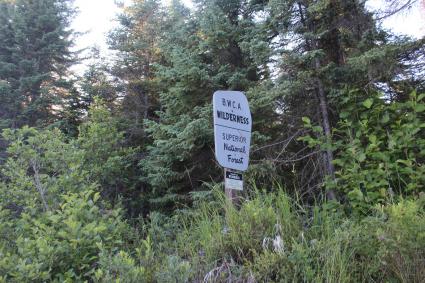Biden administration deals Twin Metals project near BWCA massive setback
The Biden administration dealt a serious blow Wednesday to the proposed Twin Metals copper-nickel mine in northeastern Minnesota, ordering a study that could lead to a 20-year ban on mining upstream from the Boundary Waters Canoe Area Wilderness.
The U.S. Forest Service filed an application with the Bureau of Land Management for a “mineral withdrawal,” which would begin with a comprehensive study of the likely environmental and other impacts of mining if it were permitted in the watershed that flows into the Boundary Waters.
The Trump administration canceled a previous mineral withdrawal study 20 months into the two year process. The Biden administration filing will result in a fully completed study and a possible 20-year ban on such mining.
In addition, the mineral withdrawal application triggers a two-year freeze on all mining-related actions on the federal lands and minerals covered by the Superior National Forest mineral withdrawal study.
“A place like the Boundary Waters should be enjoyed by and protected for everyone, not only today but for future generations,” Interior Secretary Deb Haaland said in a statement. “Today the Biden Administration is taking an important and sensible step to ensure that we have all the science and the public input necessary to make informed decisions about how mining activities may impact this special place.”
The full practical impact of the new decision on the Twin Metals project wasn’t immediately clear, the Associated Press reports. The announcement from the Agriculture and Interior Departments said the order affects lands upstream from the Boundary Waters in the Superior National Forest. It prohibits issuing new prospecting permits or leases for mining-related activities in that area. The agencies said it does not affect valid existing rights or activities on private lands including Twin Metals leases in the area, although they are currently the subject of a federal court challenge.
“Twin Metals Minnesota is deeply disappointed with the federal government’s action to initiate a mineral withdrawal study yet again on nearly 230,000 acres of land in northeast Minnesota, which sits on top of the world’s largest known undeveloped copper-nickel deposit,” the company said in statement. “We are working to determine the best path forward to continue advancing our proposed world-class underground copper, nickel, cobalt and platinum group metals mine.”
When Twin Metals, which is owned by the Chilean mining giant Antofagasta, submitted its formal mine plan to federal and state regulators in 2019, the company said its design would prevent any acid drainage and protect the wilderness from pollution.
Environmental groups disputed that claim and challenged the lease renewals in federal court, in a case that’s still pending. They welcomed the announcement.
“This is a great first step on the pathway to permanent protection,” Becky Rom, national chair of the Campaign to Save the Boundary Waters, said in a statement. "The appropriate next step for the administration is to revoke the two Twin Metals leases that the Trump administration unlawfully reinstated.”
Rom said Wednesday that a third mineral lease would be a key component in Twin Metals plans to mine near the edge of the Boundary Waters. With this understanding, Rom said the filing to “freeze” new applications could be viewed as a massive setback for Twin Metals. That being the case, Rom could not provide specifics on the exact importance of a third lease and its significance toward a Twin Metals mine on the edge of the BWCA.
Meanwhile, the news from the Biden Administration was not welcome in all circles in Minnesota, including elected officials in the same political party as President Joe Biden.
Rob Ecklund, a Democrat in the Minnesota House of Representatives whose district includes the Boundary Waters, sent a statement to WTIP about the situation.
“A fair environmental and regulatory review process for the Twin Metals project should be allowed to proceed without undue delays or interference. The roadmap announced today is duplicative, unnecessary, and arbitrary, preventing us from even considering the project and its potential to boost our regional economy,” Ecklund said. “We should follow the law and the ultimate outcome should be based in science, not politics.”
During a press briefing Wednesday afternoon, Rom and others affiliated with the Campaign to Save the Boundary Waters spoke about the mineral withdrawal application and other related news. When asked by WTIP about Ecklund’s comments, Rom said two words can summarize a Twin Metals mine and its connection to a clean economy.
“One is insignificant,” she said. “And one is irrelevant.”
The Campaign to Save the Boundary Waters published a study this week about what they describe as “greenwashing” tactics used by Twin Metals when it comes to the necessity of a mine on the edge of the BWCA as it pertains to a green economy in the future.
The audio below is Rom and Hungry Jack Outfitters owner Dave Seaton responding to Ecklund’s claims that a Twin Metals mine is necessary for a green economy.
The Associated Press contributed to this report.
Tweet







